Related Research Articles

George Meredith was an English novelist and poet of the Victorian era. At first his focus was poetry, influenced by John Keats among others, but he gradually established a reputation as a novelist. The Ordeal of Richard Feverel (1859) briefly scandalized Victorian literary circles. Of his later novels, the most enduring is The Egoist (1879), though in his lifetime his greatest success was Diana of the Crossways (1885). His novels were innovative in their attention to characters' psychology, and also took a close interest in social change. His style, in both poetry and prose, was noted for its syntactic complexity; Oscar Wilde likened it to "chaos illumined by brilliant flashes of lightning". He was an encourager of other novelists, as well as an influence on them; among those to benefit were Robert Louis Stevenson and George Gissing. He was nominated for the Nobel Prize in Literature seven times.

Thomas Hodgkin, FBA was a British historian and biographer.
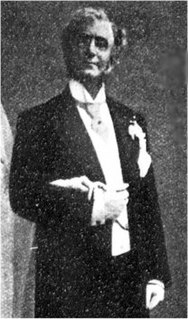
Walter Brandon Thomas was an English actor, playwright and songwriter, best known as the author of the farce Charley's Aunt.
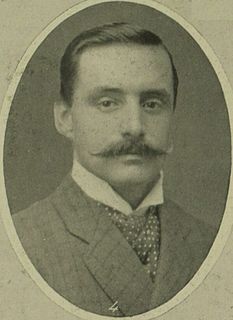
Sir Charles Edward Henry Hobhouse, 4th Baronet, TD, PC, JP was a British Liberal politician and officer in the Territorial Force. He was a member of the Liberal cabinet of H. H. Asquith between 1911 and 1915.

Sir Henry Edward McCallum, GCMG was a British colonial governor.

Thomas David Gibson-Carmichael, 1st Baron Carmichael,, known as Sir Thomas Gibson-Carmichael, 11th Baronet, between 1891 and 1912, was a Scottish Liberal politician and colonial administrator. He was also a keen naturalist.
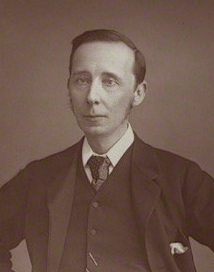
Sir Arthur Herbert Dyke Acland, 13th Baronet, PC was a Liberal politician and political author. He is best remembered for his involvement in education, serving as Vice-President of the Council of Education under William Ewart Gladstone and the Earl of Rosebery between 1892 and 1895.

(Thomas) Herbert Robertson was a British barrister and Conservative politician.
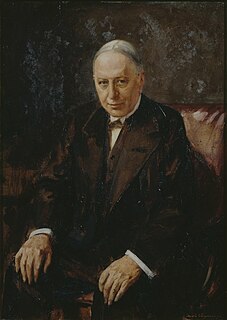
Robert Chalmers, 1st Baron Chalmers, was a British civil servant, and a Pali and Buddhist scholar. In later life, he served as the Master of Peterhouse, Cambridge.

Sir Arthur Bower Forwood, 1st Baronet, was an English merchant, shipowner, and politician. He was a Conservative Member of Parliament from 1885 until his death, and in 1895 he was created a baronet.
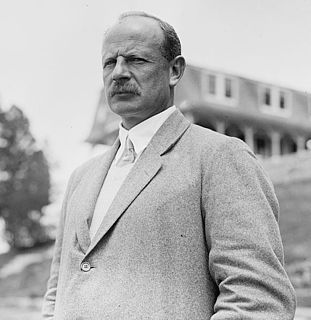
Guy Nickalls was a British rower who competed in the 1908 Summer Olympics as a member of the British eight that won gold, won 22 events at Henley Royal Regatta and won the Wingfield Sculls three times.
Major-General Sir Casimir Cartwright van Straubenzee was a Canadian officer in the British Army ; GOC Singapore and Malaya Command. In 1900, he played cricket for Canada.

George Wyndham Hamilton Knight-Bruce was an Anglican bishop serving in Southern Africa, first as bishop of Bloemfontein and then as the inaugural bishop of Mashonaland, in the late nineteenth century. Knight-Bruce was born in 1853 and, having retired early owing to ill health, died in 1896.
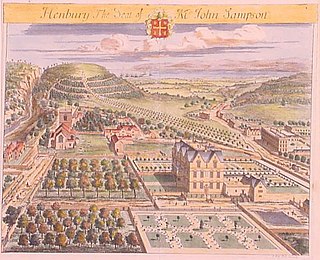
Sir William Meredith, 3rd Baronet, was a British landowner who sat in the House of Commons from 1754 to 1780. A Rockingham Whig, he served as a Lord of the Admiralty from 1765 to 1766.
Lieutenant general Sir Charles Edward Nairne was a British military officer who served in British India.
Arthur Robert Oliver was a New Zealand politician and a 19th-century Member of Parliament from Nelson, New Zealand.
John Lloyd was a Welsh-born barrister who became a prominent figure in the local government of London.

Sir Edward Loughlin O'Malley was a British lawyer and judge. He served as Attorney General and Chief Justice of a number of British colonies in the late 19th and early 20th centuries. His last position before retirement was as Chief Justice of the British Supreme consular court in the Ottoman Empire.
Harry Quilter, was an English art critic, writer and artist.

Sir James Alexander Swettenham was a British colonial administrator who was Governor of British Guiana (1901–1904) and Governor of Jamaica (1904–1907).
References
- ↑ "Physics in Oxford, 1839-1939: Laboratories, Learning and College Life" Fox,R/Gooday, G (Eds) p22: London, OUP, 2005 ISBN 9780198567929
- ↑ Singapore Heritage
- ↑ Foster, Joseph (1888–1892). . Alumni Oxonienses: the Members of the University of Oxford, 1715–1886 . Oxford: Parker and Co – via Wikisource.
- ↑ Crockford's Clerical Directory 1895 London, Horace Cox, 1895 p923
